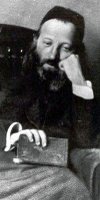Sunday, July 23, 2006
FIGHTING THE BOMBS WITH PRAYER AND SONG


With close to one million of our brethren in the North of Israel are in or near bomb shelters, Arutz-7 and Chanan Morrison* saw it fit to post the following story about HaRav Avraham Yitzchak HaKohen Kook, who had to spend several of the war years of World War One in London. I have added my own emphasis to parts of this story, to demonstrate its connection to this blog.
*Chanan Morrison, of Mitzpeh Yericho, runs RavKook.n3.net, a website dedicated to presenting the Torah commentary of Rabbi Avraham Yitzchak HaCohen Kook, first Chief Rabbi of Eretz Yisrael, to the English-speaking community. Author's Website
A Sleepless Night in a Bomb Shelter with Rabbi Kook
from Shivchei HaRe'iyah by Prof. Chaim Lifshitz, pp. 129-130; background information from Wikipedia, "Aerial bombing of cities" – by Chanan Morrison
*
Rabbi Avraham Yitzchak HaKohen Kook spent several of the war years in London, when he was unable to return to Eretz Yisrael due to the outbreak of World War I. He temporarily accepted a position as rabbi of the Machzikei HaDas synagogue of London. His private secretary, Rabbi Shimon Glitzenstein, recorded his experiences with Rabbi Kook in a booklet called Mazkir HaRav, including the following description of a sleepless night in a London bomb shelter.
*
During the aerial bombardment over London during the First World War, the residents of the city chose various shelters. The Jews who lived near Rav Kook took shelter in the cellar of the Machzikei HaDas synagogue. Against his will, Rav Kook would also go there, but only to alleviate the fears of his family.
*
The cellar was crowded and suffocating; the children wailed and the mothers complained. Some of the men gathered around Rav Kook and began reciting psalms together. As the noise and explosions increased, they stopped saying psalms. Those musically-inclined began to sing loudly in order to drown out the terrifying sounds from outside. Some people protested, but the Rav encouraged the singers to sing even more loudly.
*
After several hours of a long, sleepless night in the shelter, most people had fallen asleep. Only Rav Kook remained calmly in his spot, without a sign of fatigue or distress. In his hand he held his small Tanach (Bible), and he recited chapter 43 of Tehillim, which opens with the request: "Judge me, G-d, and fight on my behalf against a merciless nation."
*
I was accustomed to the Rav's recital of psalms when he was alone in his room. He would say them loudly, with bitter weeping and an outpouring of the soul. This recital of psalms, however, was much different. I did not listen to the words, which were said quietly, but to the unique melody which accompanied them. The tune was full of soul, permeated with a spiritual sweetness.
*
From the depth of his soul, Rav Kook poured forth his petitions before his Father in heaven. It was as if, through his voice, the entire Jewish nation was pleading for compassion: "Send Your light and Your truth; they will guide me. They will bring me to Your holy mountain and to Your dwelling place." (Tehillim 43:3)
*
The Rav was completely focused on his recitation. Even when it was announced that the danger had passed, he remained oblivious to the commotion of those gathered there, and continued reciting the chapter to the end.
***
Friends, now more than ever, we here in Israel need your prayers. Whether it's one psalm, or the entire Sefer Tehillim [Book of Psalms], or a simple prayer in your own words, please take a little time to do so. The prayers of a Jew from a sincere heart never go unheeded!
<< Home
